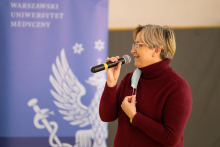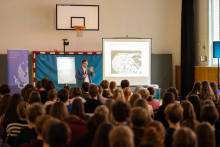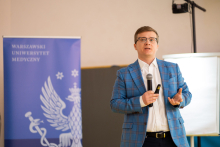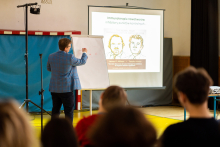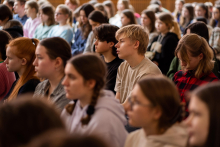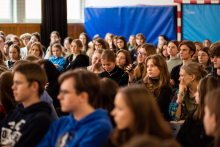Dr. Leszek Kraj had a very difficult task ahead of him, because, as he pointed out, cancers are an extremely diverse group of diseases, actually more than 300 separate conditions - each different.
-Cancer is the challenge of the 21st century. A disease of civilization. This year in Poland, almost 200,000 people will learn that they have cancer. This is as many as live, for example, in Opole and its surroundings - said Dr. Kraj - Half of them will be able to be completely cured.
These are, of course, general statistics, the lecturer stressed, as the incidence and survival rates are different in each cancer. The most common cancers in Poland are lung, breast, colorectal and prostate cancer. Meanwhile, there are only about a thousand clinical oncologists in Poland. - This is a rare specialty. A clinical oncologist provides systemic treatment of cancer and often coordinates treatment as part of multispecialty teams - Dr. Kraj explained.
Before moving on to discuss treatment methods, he explained what cancer is: - It is a mutant rebel, a group of cells in our body that divides uncontrollably. It can multiply indefinitely often occupying more organs.
During the presentation, Dr. Kraj discussed the basic methods of treating malignant tumors: surgery, radiotherapy (ionizing radiation) and, finally, systemic treatment, which is handled by a clinical oncologist.
Dr. Leszek Kraj: - Most of us associate systemic treatment in oncology with classical chemotherapy. But nowadays we also have other methods such as hormone therapy (in breast cancer and prostate cancer) or so-called targeted therapies. The latter are biological treatments using monoclonal antibodies or so-called kinase inhibitors aimed at selectively destroying cancer cells. And in many cancers, such treatments have proven spectacularly effective. For example, chronic myeloid leukemia has turned from an incurable disease leading to a quick death into a chronic condition in which the remission process takes a very long time - Dr. Kraj said. - Unfortunately, it turned out that we are not able to find equally effective therapeutic targets in all cancers.
A breakthrough in recent years in the field of systemic treatment has been immunotherapy, particularly a group of drugs known as checkpoint inhibitors.
- It turned out that in cancer, the immune system is put to sleep and tricked by cancer cells. When the immune mechanisms that cancer uses to suppress our immune system were discovered, it turned out that the immune system does not need to be specifically stimulated at all. It "only" needs to be disinhibited. For this discovery of the so-called immune response checkpoints was awarded the Nobel Prize in 2018. - reminded Dr. Kraj.
But can we consider immunotherapy the Holy Grail in oncology? Is this what we were looking for? Will we now be able to effectively treat any cancer? - wondered our expert. In his opinion, the answer is - "no".
-Despite tremendous advances in understanding the function of the immune system, we still do not understand many clinical aspects of immunotherapy. We do not know the predictive factors of response in individual patients. We don't know why it's so effective in some cancers and practically doesn't work in others. And like any therapy also immunotherapy is not an inert treatment. The big challenge nowadays is the correct diagnosis and treatment of its complications. And what can happen when we disinhibit the immune system? Then it may start to err, i.e. attack its own tissues. Such "autoaggression" on the part of the disinhibited immune system can develop anywhere in the body and at any time during treatment - Dr. Kraj said.
- As you can see, there are still many things to be discovered in clinical oncology - stressed our lecturer - if someone is thinking of combining clinical and scientific activities then this specialization is ideal.
After the lecture, the high school students asked many more questions. They were curious about how long it takes to specialize and what the daily work of a clinical oncologist is like. How to deal with the stress of working with patients diagnosed with cancer. They also inquired about certain cancers, including pancreatic cancer, which is considered the biggest killer.
The meeting was held at Warsaw's Klementyna Hoffmanowa High School No. 9. It was attended by 300 high school students not only from Hoffmanowa High School, but also from the Władysław IV High School No. 8 and the Stefan Batory High School. They were students of fourth, third and second grades with a biological and chemical profile.

